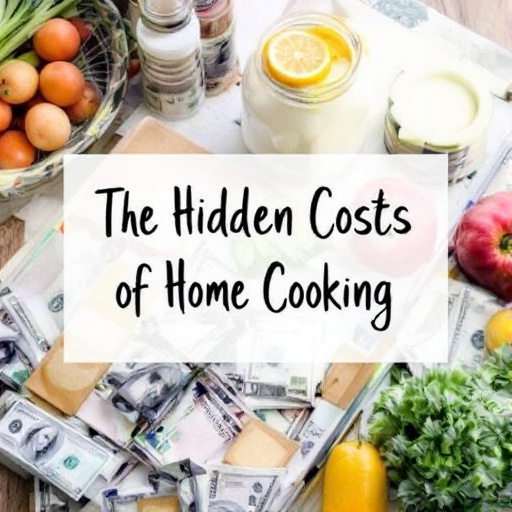Featured Articles
- "Beyond Excel: Unconventional Tools Revolutionizing Home Budget Planning in 2023"
- Budgeting for Homegrown Happiness: How Urban Gardening Can Save You Money and Enhance Your Wellbeing
- "Mindful Spending: How Minimalism Can Transform Your Home Budget Planning Journey"
- "Mindful Spending: How Minimalist Living Can Transform Your Home Budget Strategy"
- Navigating the Mind: How Psychology Can Transform Your Home Budget Planning Process
The Hidden Costs of Home Cooking: How Meal Prep Can Save You More Than Just Money
The Hidden Costs of Home Cooking: How Meal Prep Can Save You More Than Just Money
Cooking meals at home may seem like a budget-friendly option, but beyond the cost of ingredients lies a whole host of hidden expenses that can impact your wallet, time, and well-being. This article delves into the surprising benefits of meal prep, showing how planning your meals can lead not only to financial savings but also to improved health, reduced stress, and even enhanced social interactions.
The Financial Bottom Line
Let’s face it; cooking at home is often touted as the most economical choice. But is it? According to a study by the Bureau of Labor Statistics, the average American household spends about $3,000 a year on dining out (BLS, 2021). While cooking at home can save you a chunk of change, it’s crucial to consider the 'hidden costs'—those expenses you might overlook—or even underestimate—when whipping up meals in your own kitchen.
Time is Money
You’ve heard the saying “Time is money,” right? Yet, when it comes to cooking, many people underestimate just how much time they spend in the kitchen. A study by the American Time Use Survey revealed that the average individual spends about 37 minutes a day cooking, but for many, that number can rocket to over an hour, especially on evenings when they’re preparing meals after a long day at work (ATUS, 2020). If you factor in the time spent planning, shopping, and cleaning, suddenly, that "savings" doesn’t seem so substantial.
Stress Reduction and Mental Health
For those juggling careers and family life, meal prep is not just about saving money. It can also be a significant stress reliever. Picture this: it’s 6 PM, you’ve just gotten home from work, and everyone is hungry. The panic sets in, you open the fridge to find leftovers that have seen better days or a half-finished takeout from last week. With meal prep, an hour or two spent on the weekend can provide prompt access to healthy meals, removing the frantic last-minute scramble!
The Benefits of Planning Ahead
Research suggests that meal prepping can lead to better eating choices. According to a study published in the Journal of Nutrition Education and Behavior, individuals who plan meals are more likely to include vegetables, lean proteins, and whole grains in their diets. This not only helps in managing weight but also in achieving overall better health outcomes (JNEB, 2019). So, while you may spend an hour or two prepping meals, the benefit of potentially improving your overall health is priceless.
The Ripple Effect on Family Dynamics
Meal prep doesn’t just impact the wallet and waistline; it can also improve family dynamics. Imagine involving the whole family in a weekend cooking session. Not only can it transform cooking from a chore into a bonding experience, but it also encourages children to take an interest in nutrition and cooking skills. Research from the University of Minnesota suggests that children who participate in meal planning and preparation are more likely to make healthier food choices as adults (UMN, 2021).
Social Connections Through Cooking
Cooking can serve as a bridge to foster relationships. Whether it’s inviting friends over for a meal prep party or creating family-style dinners, the kitchen often becomes the heart of the home. Engaging in cooking with friends or family enhances social bonds, making everyday meal preparation a delightful experience. As popular chef Jamie Oliver puts it, “When people cook together, they share and learn, and in doing so, they inspire a new generation of food lovers.”
Case Study: The Savvy Family
Consider the Jones family, who decided to make meal prepping a Saturday ritual. Initially, they only cooked for the week, but over time they started to exchange meal prep meals with close friends. They saved an estimated $1,500 a year, but the real benefit was less stress during the week and more time spent together enjoying meals. Reflecting on their experience, Mrs. Jones stated, "What began as a money-saving effort turned into a fun family tradition." It’s proof that the benefits of meal prep can extend beyond mere finances!
The Environmental Impact
In a world grappling with climate change, the environmental message of meal prepping cannot be ignored. Home cooking typically results in better portion control and reduced food waste. According to the Food Waste Reduction Strategy, nearly 40% of food in the United States goes unused (NRDC, 2019). By planning meals ahead of time, you can shop more effectively and only purchase what you need, leading to less waste and a healthier planet.
Healthy Eating and Financial Savings
The financial savings from meal prep can also extend to health benefits. Home-cooked meals are generally lower in calories and better in nutrition than their takeout counterparts. In fact, the average homemade meal contains about 300 fewer calories compared to restaurant meals. Over time, that caloric difference can lead to significant weight loss and potentially lower healthcare costs as healthier diets lead to fewer chronic illnesses (CDC, 2022).
A Practical Approach to Meal Prep
Before diving into meal prep, it’s essential to approach it with a plan. Start small! Choose one or two meals that you enjoy, prepare them in bulk, and freeze portions for later. Gradually increase the complexity and variety of your meal prep as you become more comfortable. Websites like Budget Bytes and Meal Prep on Fleek offer vast resources, recipes, and tips to kickstart your meal-prepping journey.
Recipes That Rock Your Meal Prep
Looking for ideas? Consider these meal prep champions:
- Quinoa Salad: A durable choice that can last for days in the fridge.
- Chili: Hearty and freezable—perfect for multiple meals!
- Stir-fry: Quick to whip up, and you can change up the veggies every week.
Final Thoughts on the Hidden Costs
At the end of the day, home cooking is an investment on multiple levels. Yes, you may save money at the grocery store compared to your local takeout spot, but meal prep offers savings that are deeper than mere dollars. From the straightforward benefits of health and savings to unexpected emotional and environmental impacts, the hidden costs of not embracing meal prep far outweigh the perceived inconveniences. As a millennial writer in her 30s, I encourage everyone to consider meal prep as not just a financial strategy but as an enriching lifestyle change!
So, next time you stare at your empty fridge or consider ordering in, take a moment to envision the myriad benefits of meal prep. Get started this weekend—you might just surprise yourself with what you can create and the money you’ll save!




